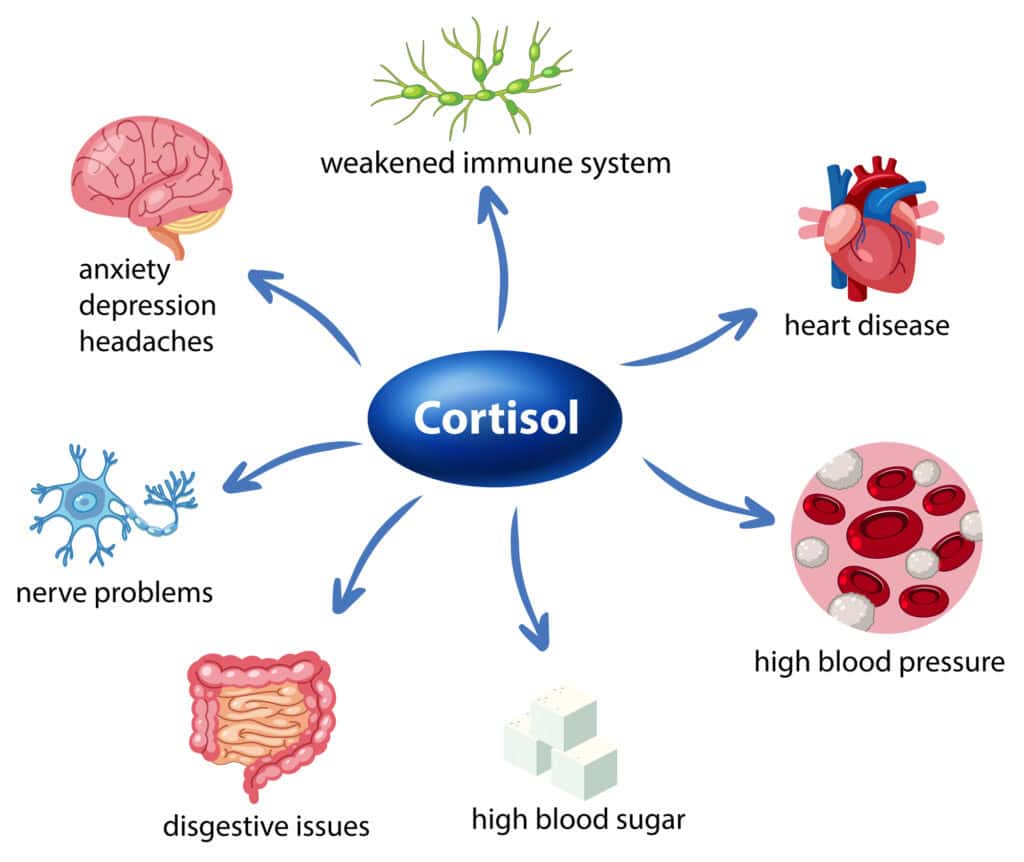EDITOR’S SUMMARY: Cortisol is a hormone that is released during a stress response. It is a normal function of cortisol to raise, and then come back to baseline. That said, undergoing chronic stress with little repose pins cortisol to a heightened position, lingering for far too long. At that point unwanted symptoms may occur, and health risks are increased. The key, therefore, is to learn how to manage stress, and engage in regular stress-reduction practices.
By Jennifer Wolff-Gillispie HWP, LC
While dopamine (neurotransmitter/hormone responsible for pleasure and motivation), oxytocin (neurotransmitter/hormone responsible for attraction and caregiving), and serotonin (neurotransmitter/hormone responsible for mood and sleep) usually get all the attention for being the “feel good” hormones, the importance of maintaining balanced cortisol levels for your mental health is just as important. As a matter of fact, American Behavioral Clinics state, “If you are depressed or have bipolar disorder, your body’s cortisol level may be to blame.”
Cortisol, often dubbed the “stress hormone,” is a vital player in the intricate orchestra of human physiology. While its evolutionary purpose is to prepare your body for the “fight or flight” response, prolonged exposure to elevated cortisol levels (usually triggered by stress) has been linked to a myriad of mental health challenges, including effects on memory, mood regulation, emotional processing, and your sleep-wake cycle. Neuroscientist and expert on optimizing your body’s performance, David Rock bestows a unique blessing:
“May your cortisol levels stay low, your dopamine levels high, your oxytocin run thick and rich, your serotonin build to a lovely plateau, and your ability to watch your brain at work keep you fascinated until your last breath. I wish you well on your journey.”
Typically, what’s reported in news and media is the association between high levels of cortisol and fatigue, weight gain, increased blood pressure, and low libido; the link to mental health issues is rarely discussed. To get a better understanding of this connection, take a look at cortisol’s role in your body.
A Bit of Physiology
The hypothalamic-pituitary-adrenal axis (HPA) is a synergistic relationship between endocrine glands in your brain (hypothalamus and pituitary) and on the kidneys (adrenal) that control your body’s reaction to stress. When your body detects a stressful situation (internal, external, or imagined), your HPA axis is almost immediately activated, preparing you for the threat. First, your body begins by almost instantly secreting epinephrine (aka adrenaline—neurotransmitter and hormone) and norepinephrine (aka noradrenaline—neurotransmitter and hormone), increasing your heart rate and perspiration to prepare you for “fight or flight.”
Approximately ten seconds later, your hypothalamus (the area of your brain that controls body temperature, hunger, and thirst) responds to this signal by producing corticotropin-releasing hormone (CRH) which enhances the effects of the epinephrine and norepinephrine. It also signals the pituitary gland to secrete a substance called adrenocorticotropic hormone (ACTH). When ACTH is released into the bloodstream, it travels to the adrenal glands, binds to receptors there, and cortisol is produced. In sincerely dangerous situations, this response is vital for your survival. Epinephrine and norepinephrine are needed to raise your heart rate and get you moving in a timely fashion. Cortisol production then increases glucose (sugar) in the bloodstream, aids the brain in the uptake of glucose, alters immune response, slows digestion, and suppresses reproductive and growth processes for the purpose of optimizing your available “fuel” for the fight.
Typically, the stress you experience in your day-to-day life doesn’t warrant having to fight or run for your life, but your body does not make that distinction. The fight you had last night with your partner might as well have been an encounter with a bear in the dark woods, as far as your body is concerned. The same chemicals/hormones are produced, resulting in increased cortisol. Ideally, your cortisol levels maintain a balanced state. This is vital in keeping you healthy holistically—mind, body and spirit. Cortisol has some very important jobs like regulating blood sugar and metabolism, stabilizing blood pressure, and reducing inflammation in your body. Lesser known are its effects on your mind which impact self-esteem, contentment, and purpose. When cortisol is out of balance, spiritual health can decline.

Suffering From the Highs and Lows of Cortisol
If you suffer from Addison’s disease (adrenal insufficiency) or congenital adrenal hyperplasia (a genetic disorder that inhibits the production of an enzyme needed to produce cortisol), you can experience a life-threatening event if your cortisol becomes too low. Conversely, if you have Cushing’s syndrome (the body produces too much cortisol) and your cortisol levels are not properly managed, this can be quite serious. Fortunately for most, these particular disorders are not typical. However, chronic elevated cortisol levels may arise from everyday stressors, such as continuous lack of sleep, ongoing heated arguments, or excess sugar, caffeine, or alcohol.
That being said, according to the American Institute of Stress (AIS), 33% of people experience extreme stress, 77% feel stress has some impact on their physical health, 73% experience an impact on their mental health, and over 48% of people report having sleep problems as a result of stress. These statistics are staggering, and impact a great majority of the population. Since stress is the literal trigger for the release of cortisol, it is not surprising many people feel mentally or physically unwell. Emerging evidence shows that prolonged exposure to high cortisol levels can actually change the physical structure of the brain. Dr. Omar Denoun, M.D., neurologist at Henry Ford Health gives a great analogy:
“With your brain, it’s like you start with a full bucket of water and every time you’re stressed, you spill some water from your bucket. If this happens time after time, it will cause your bucket to empty faster—or your brain to deteriorate faster.”
In the academic article, “Cortisol as a Biomarker of Mental Disorder Severity,” the following was revealed in connection to the brain:
“Increased secretion of cortisol in a stressful situation has consequences for the functioning and condition of our brain. The structure most exposed to high concentrations of this hormone is the hippocampus due to its large number of steroid receptors. Recurrent stress causes changes in the structure of neurons. When stress is short lived, the onset of atrophy is reversible, but long-term stress can lead to the death of neurons located in the hippocampus.”
The hippocampus is a valuable part of the brain that is involved in memory, learning, and emotion. It acts as a hub for evaluating behavioral inhibition, obsessional thinking, scanning, and spatial map formation directly affecting thoughts and conduct. Changes in this area of the brain don’t only impact memory, but mental health as well. Researchers concluded:
“Reductions in hippocampal volume have been reported in patients suffering from a variety of psychiatric disorders, including depression, addiction, and schizophrenia.”
Structural brain changes are not the only part of you that is impacted by the cortisol produced when you’re stressed. Dr. Dawn-Elise Snipes Ph.D., licensed clinical psychotherapist, licensed mental health counselor, and executive director at PACER Integrative Behavioral Health, explained how increased baseline levels of cortisol can cause a cascade of other biological actions that negatively impact your mood and mental health.
“First cortisol suppresses serotonin, the neurotransmitter related to mood. GABA (anti-anxiety, calming neurotransmitter) production is also reduced when cortisol increases. The elevated cortisol levels then work at reducing the function of the “dopaminergic system” (the synthesis and secretion of dopamine) which in turn affects mood. Endocannabinoids, another group of neurotransmitters, increase initially, but downregulate with chronic exposure to the heightened cortisol levels which can impact feelings of anxiety. Additionally, disruptions in cortisol levels can negatively alter your circadian rhythm (sleep-wake cycle) which is linked to mental health issues like anxiety and depression.”
Having had previous traumatic experiences has been shown to increase reactivity in the HPA axis disrupting cortisol production. Combat veterans with post-traumatic stress disorder (PTSD), women who have experienced childhood or adult sexual abuse, and children with PTSD stemming from abuse all showed increased levels of cortisol. In one study, patients with PTSD from childhood trauma and abuse were found to have cortisol levels 60% higher than normal, and 122% higher than normal when another stressor was added.
“Adverse Childhood Experiences” (ACEs) is a theory that makes the link between traumas children experience and health issues later in life. A quiz was developed to help you make this assessment:
“Researchers determined that 10 specific traumatic childhood experiences, or ACEs, could be linked to a higher likelihood of health challenges later in life, and that the likelihood of these negative effects increased with the number of “ACEs” a child experienced.”
Other studies on pregnant women point to how damaging elevated cortisol levels can be to the unborn child. They found that “in-utero exposure to elevated levels of the stress hormone cortisol negatively affects offspring cognition, health and educational attainment.” This means future generations are forever changed by collective stress. As mentioned before, a generous portion of the population believes stress is impacting their health. Since cortisol production is intricately linked to stress, you should know what to look for to determine if it is impacting your mental health. If you have previously or are currently experiencing any of these stressors or symptoms, elevated cortisol levels may also be impacting your mental health.
- Death of a loved one
- Divorce
- Loss of job
- Financial insecurity
- Moving
- Chronic injury or illness
- Taking care of an elderly or ill dependent
- Traumatic event
- Alcohol, drugs, or nicotine
- Lack of or irregular sleep
- Other lifestyle, environmental, dietary, and hormonal factors
Symptoms of Chronic Stress (physical and psychological)
- Fatigue
- Irritability or aggression
- Prolonged sadness
- Headaches
- Intestinal problems, such as constipation, bloating, diarrhea, or nausea
- Anxiety or racing thoughts
- Panic attacks
- Chest pain or high blood pressure
- Depression
- Weight gain
- Low libido, erectile dysfunction, or problems with regular ovulation or menstrual periods
- Difficulty recovering from exercise
- Problems with concentration or memory
- Poor sleep
- Muscle pain or tension in the head, neck, jaw, or back
Chronic stress and elevated cortisol left unchecked may not only affect your mental state, but can turn into a bigger health crisis. Some healthcare professionals believe that consistent and persistent elevated cortisol can lead to further dysfunction. “Tired” adrenals and depleted cortisol production can amount to adrenal fatigue and metabolic syndrome (a series of biochemical and physiologic changes that can result in cardiovascular disease and type 2 diabetes).
Being unwell physically also has a huge bearing on your mental state. If you suspect you have a problem with stress and cortisol, your doctor can run blood, saliva, and/or hair analysis (depending on your needs). An ACTH stimulation test, dexamethasone suppression test, MRI, and CT scans may also be ordered. Cortisol naturally ebbs and flows at different parts of the day, and is intricately connected to other hormones. Therefore, having a professional interpret your findings is important in order to understand all angles.

You Are a Co-participant in Your Health
If you do not have overt life stressors but believe cortisol may be impacting your health, perhaps taking a closer look at your habits could give you insight. Below you will find practical ways to lower your cortisol levels, alleviate stress, and boost your mood:
- Adequate sleep: Ensure you get 7–9 hours of quality sleep each night. Lack of sleep can elevate cortisol levels, impacting mood and cognitive function. Establish a consistent sleep routine, and create a sleep-conducive environment—dark, cool temperature; no synthetic lights or activated mobile devices.
- Regular exercise: Engaging in consistent physical activity helps reduce cortisol levels. Aim for at least 30 minutes of moderate exercise most days of the week, such as brisk walking, swimming, dancing, or yoga.
- Nutrient-rich diet: Consume a well-balanced diet rich in organic fruits and vegetables, grass-fed animal proteins, bone broth, raw dairy, and fermented foods. B-12, Omega-3, and magnesium all help stabilize cortisol production. Avoid excessive caffeine, refined sugars, and linoleic acid (LA) from seed oils, as they can contribute to cortisol spikes.
- Mindfulness and meditation: Practices such as yoga and deep breathing which naturally incorporate mediation can help reduce stress and lower cortisol levels. Several studies have proven these tools to be extremely powerful in lowering cortisol. Infuse these techniques into your daily routine to promote relaxation.
- Social connections: Maintain strong social connections and spend time with friends and family. Positive social interactions can buffer against stress, and contribute to lower cortisol levels.
- Manage time effectively: Prioritize tasks, set realistic goals, and break them into smaller, manageable steps. Effective time management can prevent feelings of overwhelm, and reduce stress-related cortisol release.
- Limit stimulants: Minimize the intake of stimulants such as coffee, tea, and chocolate, especially in the afternoon and evening. Stimulants can disrupt sleep patterns and contribute to elevated cortisol.
- Laugh and have fun: Laughter can have a positive impact on cortisol levels. Engage in activities that bring joy and humor into your life, whether that’s watching a funny movie, playing with your dog, or spending time with friends who make you smile.
- Establish boundaries: Set clear boundaries to manage stressors effectively. Learn to say no when necessary, and prioritize self-care to avoid unnecessary overwhelm and worry.
- Get in the Sun: Spend time outdoors and get exposure to natural sunlight. Taking in sunshine helps regulate circadian rhythms and can positively impact cortisol secretion.
- Stay well-hydrated: Dehydration can lead to increased cortisol production. Aim for at least eight glasses of clean, filtered, or spring water per day.
- Get a massage: Regular massages or other relaxation therapies can promote relaxation and help reduce cortisol spikes. This type of physical medicine can lower cortisol in the body.
- Seek professional support: If stress and cortisol levels continue to be a challenge, consider accepting help from a healthcare professional, such as a counselor, coach, or spiritual guide. They can provide insight, support, and tailored interventions.
- Consider Cognitive Behavioral Therapy (CBT): This therapeutic approach helps identify and change negative thought patterns and behaviors contributing to stress. CBT has shown efficacy in reducing cortisol levels.
- Explore CBD (Cannibidiol): One of the non-psychoactive components of marijuana, CBD, has been shown to reduce cortisol levels and lower stress effectively.
Author Dan Harris in his book, “10% Happier: How I Tamed the Voice in My Head, Reduced Stress Without Losing My Edge, and Found Self-Help That Actually Works” gave the following suggestions for decreasing cortisol:
“Science experiments have found that people who practice meditation release significantly lower doses of cortisol, known as the stress hormone. Science is also proving that petting your dog or cat just 10 minutes per day can lower cortisol as well. This is consequential because frequent release of cortisol can lead to heart disease, diabetes, dementia, cancer, and depression.”
When you adopt effective coping mechanisms, you are less likely to perceive stressors as overwhelming threats. This shift in perception diminishes the activation of your body’s stress response, leading to a decrease in cortisol release. These proactive approaches to stress can create an effective buffer against the detrimental effects of chronic cortisol elevation. In turn, this promotes good mental and physical health. Ultimately, making a conscious effort to manage stress can become a powerful tool. The goal is to maintain a balanced cortisol profile, and foster a healthier, more resilient mind and body.
~
Published on July 11, 2024.
If you’ve found value in this article, please share it!
To support the research and health education of AVFC editorial, please consider making a donation today. Thank you.

